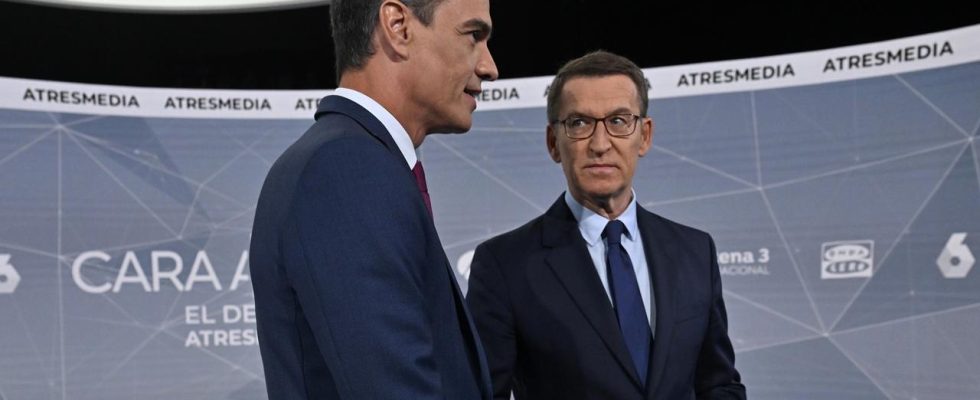analysis
After the election, Spain is threatened with political deadlock. The conservatives and socialists each lack majorities. But then why not coalition together?
Spain voted, and the result is a stalemate: the conservative People’s Party is unable to organize a majority in the right-wing camp, and the Socialists have only the slimmest of chances of achieving this in their camp. There has been a grand coalition in Germany several times in a similar situation. There is even a Spanish Wikipedia entry for the German “Gran coalición”.
But even if Germany is seen as a role model by many in Spain, such a “marriage of convenience” between conservatives and socialists seems unthinkable. Society has been deeply divided for generations since the civil war – or is it coming? “The election result gives us the mandate to reach an agreement, the Spaniards must not remain trapped in blockades and blocs,” said Alfredo Nuñez Feijóo from the conservative People’s Party after the election.
“Breaking blocks.” One might think that the failed election winner is now advocating for a grand coalition after he failed to replace Pedro Sanchez’s left-wing minority government.
“Spain has no tradition of grand coalition”
That would be a mistake, says political scientist Fernando Vallespin: “That’s not an option. One of the two major parties has the option of forming a government and not forming a coalition with the political opponent. Spain has no tradition of grand coalitions, and given the heatedly polarized nature of things, I think that’s completely out of the question.”
The political scientist, who headed the state Institute for Sociological Studies for a long time, is certain that the socialists, together with the left-wing alliance Sumar, will try to continue the minority government. Although they would have to rely on JuntsXCat, the party of hardcore separatist Carles Puigdemont, who fled to Brussels from Catalonia.
“Separatist parties could make demands that are unacceptable because they violate the constitution. But negotiations can lead to agreement in principle and difficult issues are negotiated later,” Vallespin said. In fact, JuntsXCat has already set the price high: the separatists are demanding amnesty for convicted separatists and – particularly problematic – a referendum on the future of Catalonia.
Deep trenches between the left and the right camp
In view of this difficult situation, why does nobody in Spain even consider the talk of “overcoming the blocs” as a plea for a grand coalition? Because the rift between the left and right camps has been digging deep in Spanish society for decades – not least due to the civil war and the subsequent Franco dictatorship: “The People’s Party emerged from the democratically socialized part of Francoism, so to speak, even if young people later joined it and it renewed itself with people who no longer had anything to do with the civil war,” explains the political scientist.
The conservative People’s Party has its origins in the Alianza Popular, which was founded by former Franco Minister Manuel Fraga. With the transition to democracy, the Transicion, Spain passed an amnesty law in 1977. That was correct at the time, the late publicist Walter Haubrich once said in an ARD interview.
As a correspondent, he witnessed Spain’s transition to democracy first-hand: “After Franco’s death, everything was suppressed at first. The holders of actual power were all people from the Franco era, Francoists. In the military, in money, in the banks and in the economy.” The left also agreed at the time; It was believed that this was the only way to make a kind of new beginning.
No reappraisal of the Franco dictatorship
There was no coming to terms with the civil war and dictatorship – but the conflict, the crimes, the guilt did not vanish into thin air, but solidified in the political camps. When the ruling Socialists had the last Franco statue in Madrid removed by crane in 2005, the leader of the People’s Party at the time, Mariano Rajoy, complained that it was a breach of the spirit of transition: “We decided to look ahead, nobody wants to go back to the past.” In the end, in 2007, his People’s Party approved the first law on state processing – but when it came to government, it cut all public funds for the exhumation and identification of victims of the civil war.
The gulf is deep between the political camps, in society. It’s not for nothing that people also speak of the “Two Spains,” says political scientist Vallespin: the traditional, conservative-Catholic one and the one of diversity, which also cultivates regional differences.
Worry about the growth of extreme parties
Compared to the past, what was once a de facto two-party system of conservatives and socialists has changed into a more colorful party landscape. Vallespin believes that this makes a grand coalition even more impossible: “If the two governed together, the parties could grow on the extreme fringes, and both would like to avoid that. That doesn’t mean that important individual agreements aren’t possible, such as with the climate protection law or against separatist efforts – but a strategy of conflict and polarization predominates.”
So when the Conservatives’ Alfredo Nuñez Feijóo says that the current election result calls for “understanding between the blocs,” he doesn’t mean joint government with the Socialists, but suggests that they may tolerate a minority government led by him.

